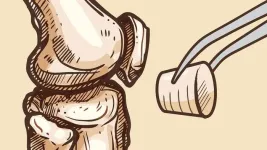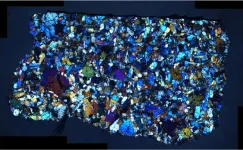(Press-News.org) Novel CAR T cell therapy obe-cel yields strong remission rates in adults with relapsed or refractory B-ALL (Abstract 6504)
The novel anti-CD19 autologous chimeric antigen receptor (CAR) T cell therapy obecabtagene autoleucel (obe-cel) achieved durable remissions in 40% of patients with relapsed or refractory B-ALL without a subsequent stem cell transplant (SCT), according to results from the Phase Ib/II FELIX clinical trial presented today by Elias Jabbour, M.D., professor of Leukemia.
At a median follow-up of 21.5 months, these patients were in ongoing remission without SCT or other therapies. The 12-month event-free survival (EFS) and overall survival (OS) rates were 49.5% and 61%, respectively.
Eighteen percent of patients, all with no measurable residual disease, went on to receive a SCT after obe-cel infusion. Of these patients, 55% had persistent CAR T cells present prior to transplant. The median time to SCT was 101 days after treatment.
The median EFS and 12-month EFS rate were identical between those who did and did not receive a SCT, and similar findings were observed when researchers assessed for OS. These results suggest that SCTs did not offer additional value for these patients and that obe-cel could be considered as a standalone treatment, Jabbour explained.
“We observed that persistence of CAR T cells and B-cell aplasia both were associated with improved event-free survival in patients treated with obe-cel,” Jabbour said. “These outcomes demonstrate a potential of a long-term plateau in the survival curve, which supports this therapy being considered as a standard-of-care for adults with relapsed or refractory B-ALL who currently have limited treatment options.” B-cell aplasia occurs when anti-CD19 CAR T cells kill CD19-expressing B-lymphocytes causing a patient to have an extremely low B-cell count.
The open-label, multi-center, single-arm trial treated 127 adult patients with relapsed or refractory B-ALL with obe-cel. Trial participants had lymphodepletion, an important step that kills existing T-cells to create a blank slate for CAR T cell therapy, followed by obe-cel infusion in split doses on days one and 10. Side effects were consistent with previous studies, and no new adverse effects were identified.
The study was funded by Autolus Therapeutics. A complete list of collaborating authors and their disclosures can be found with the abstract here.
Shorter durations of venetoclax yields similar response rates in AML (Abstract 6507)
When combined with azacitidine, a 7-day course of venetoclax demonstrated similar remission rates and was more tolerable compared to the standard 28-day course for older or chemotherapy-ineligible patients with newly diagnosed AML. Results from the retrospective multi-center analysis were presented today by Alexandre Bazinet, M.D., assistant professor of Leukemia.
Both groups had a composite complete remission rate of 72%, and the median OS for the shorter duration cohort was 11.2 months compared with 10.1 months for the longer duration cohort. Interestingly, OS with standard dosing was longer in patients without high-risk mutations, suggesting these patients have a more “sensitive” leukemia that responds well to more venetoclax exposure. Additionally, the 8-week mortality rate was significantly higher in the 28-day treatment group compared to the 7-day group at 16% vs 6%, respectively.
“Our findings suggest shorter courses of venetoclax for the treatment of AML may help reduce side effects and improve patients’ tolerability of treatment without compromising response rates,” Bazinet said. “Older patients tend to experience more side effects and often have additional medical issues which increases the risk of serious complications. It’s important to identify treatment options that can produce similar rates of remission and survival for these patients.”
In a retrospective analysis, researchers compared data from 82 patients treated with the shorter 7-day venetoclax course to that of 166 patients treated with the current recommended 28-day course. Responses were slower with the 7-day course compared to the standard course, often requiring more than one cycle to achieve the first response. However, most patients eventually responded with added cycles, resulting in an equal composite complete remission rate between the cohorts.
Researchers observed a significantly lower need for platelet transfusions and lower early mortality in patients receiving the 7-day course, suggesting the shorter course was more tolerable.
The study supports use of shorter courses of venetoclax in triplet regimens such as those being developed by MD Anderson researchers to treat older or chemotherapy-ineligible patients.
A complete list of collaborating authors and their disclosures can be found with the abstract here.
END
ASCO: Novel CAR T therapy and shorter targeted therapy durations show promise for patients with leukemia
Clinical trial results suggest new treatment options could reduce need for stem cell transplants and long treatment regimens for some patients
2024-05-31
ELSE PRESS RELEASES FROM THIS DATE:
Synthetic plugs offer alternative to total knee replacements
2024-05-31
Osteochondral defects (OCDs) can cause damage to cartilage and underlying bone, leading to chronic pain and loss of joint function. Depending on the extent of damage, individuals must undergo surgical treatment, the most extensive being total knee replacement, which over 800,000 Americans undergo each year.
Dr. Melissa Grunlan, professor in the Department of Biomedical Engineering at Texas A&M University, received a grant from the National Institute of Arthritis and Musculoskeletal and Skin Disease, a suborganization of the National Institutes ...
CU researchers analyze prevalence, impact of ethical or religious barriers to providing medical aid in dying
2024-05-31
Recently published research led by the University of Colorado Anschutz Medical Campus examined the prevalence — and impact — of physicians’ ethical or religious barriers to their involvement in medical aid in dying (MAiD), a multi-step process where a physician provides a terminally ill adult with decision-making capacity with a lethal dose of medication to end their life.
The research article, “Conscience-Based Barriers to Medical Aid in Dying: A Survey of Colorado Physicians,” was published this May in the Journal of General Internal Medicine. It shows that 26% of physician ...
Want to be a successful scientist? The McClements family has some tips
2024-05-31
The latest book of prolific author David Julian McClements is a family affair. The Distinguished Professor of Food Science, along with his daughter Isobelle Farrell McClements and nephew Jake McClements, have written “How to be a Successful Scientist: A Guide for Graduate Students, Postdocs, and Professors” (Springer, 2024).
The three authors offer different perspectives as scientists at different stages in their careers. Julian McClements, who has published more than 1,300 scientific articles and numerous books, is the most highly ...
Overcoming barriers to heat pump adoption in cold climates and avoiding the 'energy poverty trap'
2024-05-31
Converting home heating systems from natural gas furnaces to electric heat pumps is seen as a way to address climate change by reducing greenhouse gas emissions.
But a new University of Michigan study of 51 Southeast Michigan households shows that switching to efficient, cold-climate heat pumps would increase annual utility bills by an average of about $1,100.
Home weatherization upgrades, such as adding attic insulation and sealing around doors and windows, could help reduce utility bills and make ...
A new way to see viruses in action
2024-05-31
A new, nano-scale look at how the SARS-CoV-2 virus replicates in cells may offer greater precision in drug development, a Stanford University team reports in Nature Communications. Using advanced microscopy techniques, the researchers produced what might be some of the most crisp images available of the virus’s RNA and replication structures, which they witnessed form spherical shapes around the nucleus of the infected cell.
“We have not seen COVID infecting cells at this high resolution and known what we are looking at before,” said Stanley Qi, ...
Wealthier neighborhoods in Boulder saw lower bee diversity
2024-05-31
Community gardens in higher-income Boulder neighborhoods have fewer varieties of bees than their medium-income counterparts, new University of Colorado Boulder research suggests. Scientists suggest that people in these neighborhoods tend to apply more landscaping practices, such as using fertilizers, which could impact bees’ habitats.
The finding appeared May 22 in the journal Urban Ecosystems.
“Bees are so important for local ecosystems through their pollination services. The landscape would not look the same without our pollinators,” ...
Advancing excellence top priority for new board chair
2024-05-31
At its annual meeting on Thursday, the University of Miami Board of Trustees (BOT) confirmed Manuel “Manny” Kadre as its new chair, Wayne Chaplin and Bill Morrison as new vice chairs, and welcomed a slate of new trustees.
Kadre, chairman and chief executive officer of MBB Auto Group as well as a senior executive and shareholder of a number of beverage, automotive, health care, and real estate companies, first joined the board as a trustee in 2004. He served as a vice chair since June 2021 and more recently as board chair-elect.
“The University has one of the great reputations and brand names anywhere in the world,” ...
Martian meteorites deliver a trove of information on Red Planet’s structure
2024-05-31
Mars has a distinct structure in its mantle and crust with discernible reservoirs, and this is known thanks to meteorites that scientists at Scripps Institution of Oceanography at UC San Diego and colleagues have analyzed on Earth.
Meteorites that formed roughly 1.3 billion years ago and then ejected from Mars have been collected by scientists from sites in Antarctica and Africa in recent decades. Scripps Oceanography geologist James Day and his colleagues report May 31 in the journal Science Advances ...
Can ketones enhance cognitive function and protect brain networks?
2024-05-31
Researchers at the Del Monte Institute for Neuroscience at the University of Rochester have identified mechanisms in the brain’s hippocampal network that are rescued by ketones. These findings build on previous research showing that ketones can alleviate neurological and cognitive affects.
As we age our brain naturally becomes more insulin resistant. This creates a breakdown in communication between neurons, causing symptoms like changes in mood, cognitive decline, and eventually neurodegeneration. Nathan A. Smith, MS, PhD ('13), associate professor of Neuroscience, and fellow researchers studied the mechanisms in the brain that break down when insulin resistance is suddenly ...
AMS Science Preview: Sea-ice loss may accelerate; tornadoes and flying cars
2024-05-31
The American Meteorological Society continuously publishes research on climate, weather, and water in its 12 journals. Many of these articles are available for early online access–they are peer-reviewed, but not yet in their final published form.
Below is a selection of articles published early online recently. Some articles are open-access; to view others, members of the media can contact kpflaumer@ametsoc.org for press login credentials.
JOURNAL ARTICLES
Large-Scale Climate Modes Drive Low-Frequency Regional Arctic Sea Ice Variability
Journal of Climate
Arctic sea ice loss may accelerate in the coming decade. This study examined the dominant natural climate ...
LAST 30 PRESS RELEASES:
Duke-NUS scientists identify more effective way to detect poultry viruses in live markets
Low-intensity treadmill exercise preconditioning mitigates post-stroke injury in mouse models
How moss helped solve a grave-robbing mystery
How much sleep do teens get? Six-seven hours.
Patients regain weight rapidly after stopping weight loss drugs – but still keep off a quarter of weight lost
GLP-1 diabetes drugs linked to reduced risk of addiction and substance-related death
Councils face industry legal threats for campaigns warning against wood burning stoves
GLP-1 medications get at the heart of addiction: study
Global trauma study highlights shared learning as interest in whole blood resurges
Almost a third of Gen Z men agree a wife should obey her husband
Trapping light on thermal photodetectors shatters speed records
New review highlights the future of tubular solid oxide fuel cells for clean energy systems
Pig farm ammonia pollution may indirectly accelerate climate warming, new study finds
Modified biochar helps compost retain nitrogen and build richer soil organic matter
First gene regulation clinical trials for epilepsy show promising results
Life-changing drug identified for children with rare epilepsy
Husker researchers collaborate to explore fear of spiders
Mayo Clinic researchers discover hidden brain map that may improve epilepsy care
NYCST announces Round 2 Awards for space technology projects
How the Dobbs decision and abortion restrictions changed where medical students apply to residency programs
Microwave frying can help lower oil content for healthier French fries
In MS, wearable sensors may help identify people at risk of worsening disability
Study: Football associated with nearly one in five brain injuries in youth sports
Machine-learning immune-system analysis study may hold clues to personalized medicine
A promising potential therapeutic strategy for Rett syndrome
How time changes impact public sentiment in the U.S.
Analysis of charred food in pot reveals that prehistoric Europeans had surprisingly complex cuisines
As a whole, LGB+ workers in the NHS do not experience pay gaps compared to their heterosexual colleagues
How cocaine rewires the brain to drive relapse
Mosquito monitoring through sound - implications for AI species recognition
[Press-News.org] ASCO: Novel CAR T therapy and shorter targeted therapy durations show promise for patients with leukemiaClinical trial results suggest new treatment options could reduce need for stem cell transplants and long treatment regimens for some patients





